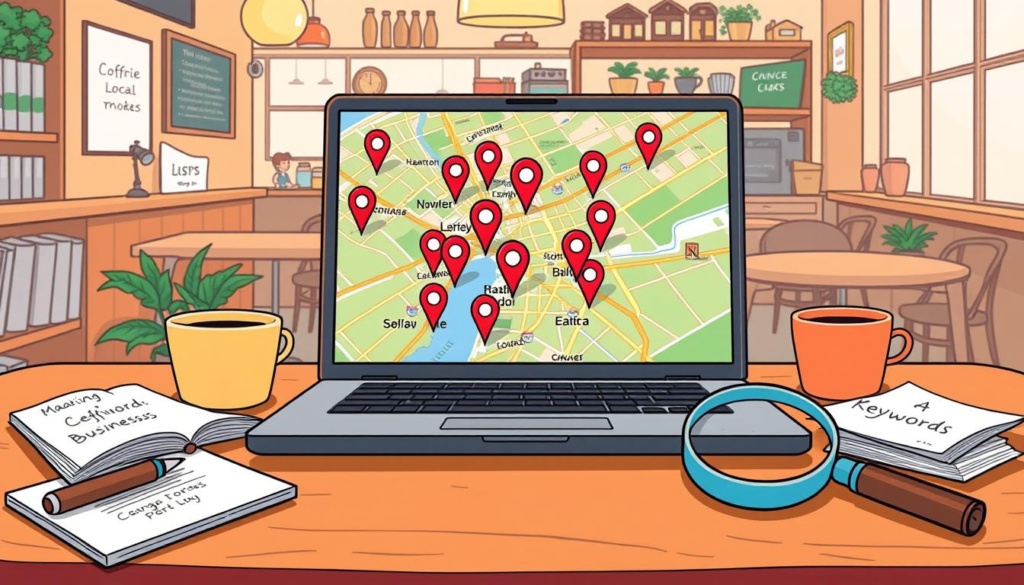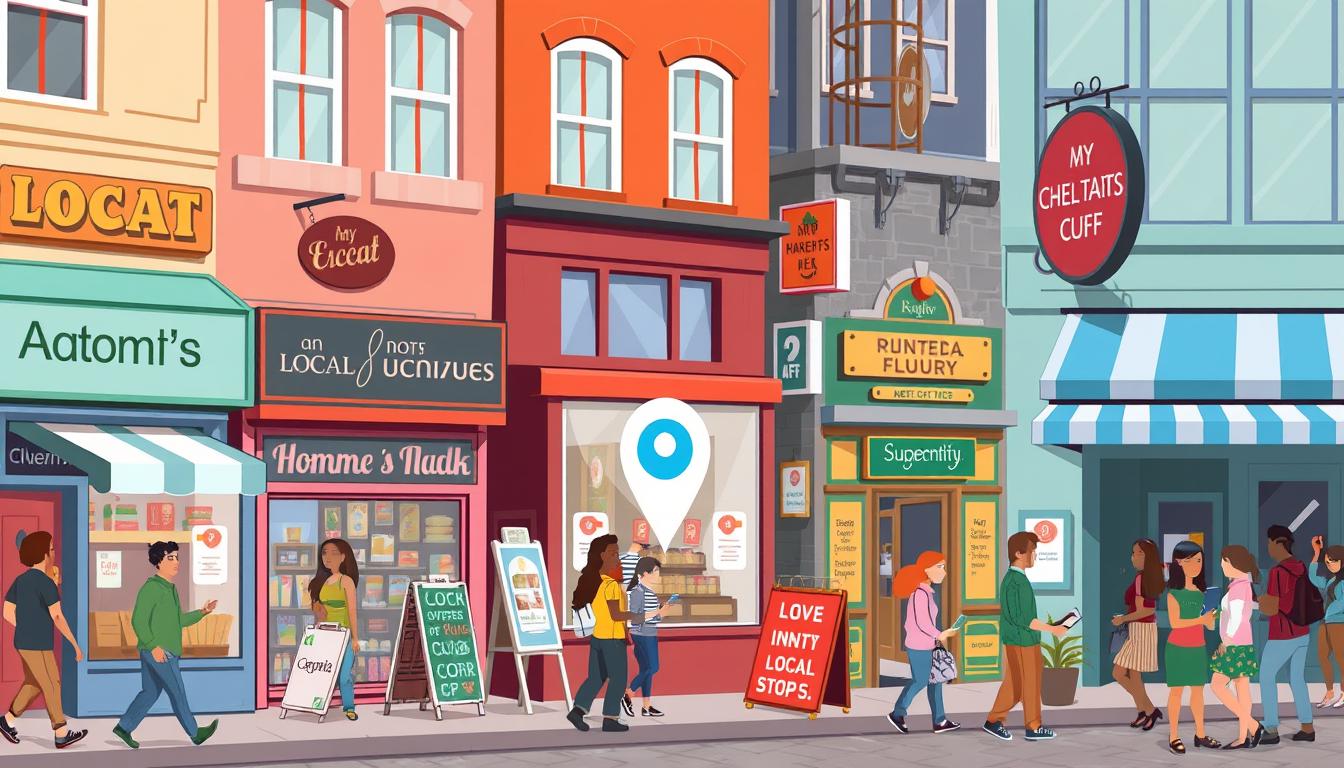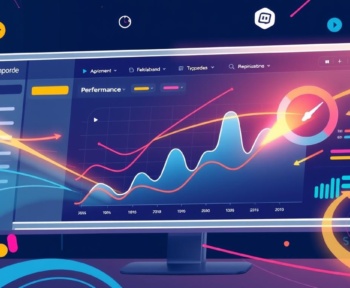In today’s world, people use local search to find things close to them. Businesses need to focus on hyper-local SEO to stand out. This means making your online presence better for people in your area. It helps local shops, restaurants, and services get more people to visit them1.
Good hyper-local SEO includes many things. It’s about making your Google Business Profile better, getting local mentions, and getting good reviews. It also means making your website easy to use on phones and for voice searches. Doing these things can help your business show up more in local searches. This can lead to more customers, sales, and growth12.
Key Takeaways
- Hyper-local SEO is key for businesses in a specific area to get more online visibility and foot traffic.
- A good hyper-local SEO plan includes a great Google Business Profile, local mentions, reviews, and content for your area.
- Using local keywords, connecting with your community, and checking how you’re doing are important for a successful hyper-local SEO campaign.
- Keeping up with new trends and search changes is vital for a strong local online presence.
- Businesses that focus on hyper-local SEO can see more brand awareness, trust, and money from their local customers.
Understanding Hyper-Local SEO
In today’s world, just having a big online presence isn’t enough. Hyper-local SEO helps businesses show up in local searches. It’s great for small businesses because it lets them meet the needs of their community3.
What is Hyper-Local SEO?
Hyper-local SEO makes a business more visible in a specific area. It uses location-based keywords and local content. This way, more people can find and use what the business offers3.
Why It Matters for Small Businesses
For small businesses, hyper-local SEO is key. It helps them shine in their area. They can beat bigger companies by knowing their community better3.
Using hyper-local SEO, small businesses can build strong ties with their customers. This leads to loyalty and more business3.
Hyper-local SEO is a big help for small businesses. It lets them connect with their audience better. By using these strategies, small businesses can grow and succeed in their local markets3.
Optimizing Your Google My Business Profile
Google My Business (GMB) helps local businesses get seen online. It makes your business show up in Google Maps and local searches. This brings more people to your place and more calls4.
Key Elements of a GMB Listing
Make sure your GMB listing is up to date. Include your business name, address, phone number, hours, and categories. This helps Google show the right info to people4.
Tips for GMB Optimization
- Use good photos of your business, products, and services.
- Post updates, offers, and events to keep things interesting.
- Answer customer reviews to show you care about them.
- Verify your listing through Google’s process.
Encouraging Customer Reviews
Reviews are key for local SEO. Ask happy customers to leave reviews on your GMB and other sites like Yelp4. Reply to all reviews to show you value your customers4.
“46% of all Google searches are seeking local information, emphasizing the necessity of optimizing for local search in the HVAC industry.”5
Optimizing your Google My Business profile boosts your local presence. It attracts more customers and grows your business. Keep your info right, talk to your customers, and use positive reviews to make your GMB listing strong4.
| Key GMB Optimization Tactics | Benefits |
|---|---|
| Accurate NAP (Name, Address, Phone) | Improves local search visibility and trust |
| Frequent profile updates and posts | Keeps your listing fresh and engaging |
| Responding to customer reviews | Demonstrates commitment to customer service |
| Encouraging positive reviews | Enhances local reputation and credibility |
Conducting Local Keyword Research
Starting with local keyword research is key. Find the right words and phrases people in your area use. This helps your business show up more in local searches.
Tools for Finding Local Keywords
Use many tools to find great local keywords. Google Keyword Planner shows search volume and competition. Google Trends helps see keyword popularity over time and in different places. Google Suggest finds long-tail keywords with local intent6.
Analyzing Search Intent
Understanding what people search for is important. Are they looking for info, a business, or to buy something? Knowing this helps make content that meets their needs and boosts chances of them taking action7.
Long-Tail Keywords for Local Targeting
Use long-tail keywords that include location. For example, “best coffee shop in Boulder” or “emergency plumbing in Denver.” These keywords are less competitive and attract more relevant customers7.
By using local keyword tools, understanding search intent, and targeting long-tail keywords, you can create a strong content strategy. This will improve your local visibility and attract more customers.

“Effective local keyword research is the foundation for successful geo-targeted content creation and proximity signals enhancement.”
Creating Location-Specific Content
In local SEO, making content for your area is key. It helps businesses show up well in their area. This makes them more visible and trusted by local people8.
Importance of Localized Content
More than 46% of all Google searches are local. This shows how important being seen locally is8. Brands that make content for their area get 2.6 times more engagement than others8. Also, having the same info everywhere online is vital for good local SEO8.
Types of Content to Create
There are many types of content for local areas. For example, a plant nursery in Chicago could write about plants for Zone 58. Using location-based schema markup helps search engines show more info about your business8.
Engaging with Local Events and News
Getting involved in local events and news is great. It shows you care about the community. This builds trust and strong connections with locals8. Building local backlinks helps your SEO too8.
Using location-specific content is powerful. It helps businesses grow by being seen and trusted locally. This way, they connect better with their community and succeed.
Building Local Citations
Local citations help your business show up online. They include your business name, address, and phone number on different websites. This makes search engines trust your business more9.
What are Local Citations?
Local citations are mentions of your business online. They include your name, address, and phone number. You can find them on local directories, social media, and more. They make your business look good to search engines and customers9.
Strategies for Acquiring Citations
- Put your business on local sites like Google My Business and Yelp. This makes sure your info is right9.
- Look for special directories for your industry. They give you targeted citations9.
- Use social media like Facebook and Twitter. It helps make your business more visible online9.
Keeping NAP Consistent
It’s important to have the same business info everywhere online. If your info changes, search engines get confused. This can hurt your ranking9.
| Local SEO Metric | Importance | Data |
|---|---|---|
| Consistent NAP | Vital for search engine recognition and customer trust | 9 |
| Keyword Research | Essential for effective local SEO strategy | 9 |
| Competitive Landscape Analysis | Crucial for identifying opportunities and outperforming local competitors | 9 |
| Google My Business Optimization | Critical for local search visibility | 9 |
Using local citations and keeping your info the same helps your business. It makes you more visible and trustworthy online. This brings more local customers to you9.
Leveraging Social Media for Local Engagement
Social media is a big deal today. It helps businesses talk to their local community. Over 5 billion people use social media, which is 61% of the world’s population10.
Selecting the Right Platforms
Choosing the right social media is key. People check out 7 social networks a month. They spend about 2.5 hours a day on social media10. Knowing where your customers hang out online helps a lot.
Promoting Local Offers and Events
Social media is great for sharing what you offer. It makes your brand more visible online10. It also helps you connect with people in a meaningful way10.
Using Facebook and Instagram’s location features helps you reach more locals. This way, you can grow your business and keep customers happy10.

Good social media plans have clear goals and know who to talk to. They also have a content plan and post at the right times10. This way, your social media helps your business grow.
“54% of people use social media to research products11, and 25% of TikTok users say they have purchased or researched a product after seeing a TikTok about it11. Social media is a big chance for businesses to connect with locals.”
In short, social media is a powerful tool for businesses. It helps them talk to locals, share what they offer, and grow. By picking the right platforms and making good content, businesses can really connect with their community1011.
Encouraging Customer Reviews and Testimonials
Getting customer reviews and testimonials is very important. They help shape what others think of you. They also help improve your local SEO12.
Requesting Reviews Effectively
Ask happy customers to leave reviews on Google, Yelp, and Facebook. Give them direct links to make it easy. Personal messages work better than general requests12.
Responding to Customer Feedback
Always answer reviews quickly, good or bad. Say thank you and fix any problems. This shows you care about your customers13.
Showcasing Positive Reviews
Show off good reviews on your website and social media. Pick the best ones that show what you offer. This builds trust and shows you’re reliable14.
By asking for reviews, answering them, and sharing good ones, you can manage your online image well. This can lead to better search rankings, more trust, and a stronger local connection121314.
| Metric | Improvement |
|---|---|
| Contact Requests | 60% increase |
| Pipeline Growth | 40,000€ in 2 months |
“Showcasing reviews from various platforms like Google, Tripadvisor, and Booking.com on our landing pages has enhanced the credibility of our brand and resulted in increased trust from potential customers.” – Vanajanlinna
Tracking and Analyzing Your Local SEO Performance
It’s important to check how well your local SEO is doing. This helps you make smart choices that grow your business. By watching important numbers and using the right tools, you can learn a lot about your local search performance.
Key Metrics to Monitor
First, keep an eye on your local search rankings. This shows how visible you are in local searches15. Also, watch how many people visit your site from local searches and how many of them do something important15.
Tools for Performance Tracking
Use strong tools like Google Analytics, Google Search Console, and local SEO tools to get and understand your data15. These tools give you deep insights into how visible you are, how people interact with your site, and how well your site is set up. This helps you make smart choices.
Making Data-Driven Decisions
By watching your local SEO numbers closely and understanding the data, you can see what’s working and what’s not15. Use this knowledge to improve your local SEO. This could mean making your Google My Business profile better, creating more focused content, or changing your local keywords15.
By using data to guide your local SEO, you can keep getting better and better online in your local area151617.
Staying Updated with Local SEO Trends
To stay ahead in local SEO, keep up with new trends and changes. Follow trusted news sources and blogs. This helps you know about search algorithm updates and new ways to improve your online presence18.
Following Industry News
Read Search Engine Land, Moz, and Search Engine Journal often. They share the latest on local SEO, like Google’s algorithm changes18. Also, watch what experts say on Twitter and LinkedIn. This helps you keep your SEO plans fresh.
Networking with Local SEO Experts
Talk to local SEO pros online and at events. Join local business groups too. You’ll learn a lot and get tips to help your business grow19.
Adapting to Changes in Search Algorithms
Search engines keep improving their algorithms. Businesses need to keep up. For example, Google now focuses on mobile speed18. Stay alert to these updates and adjust your SEO plans quickly. This keeps you competitive in local searches.
FAQ
What is Hyper-Local SEO?
Hyper-local SEO makes your business easy to find online in a small area. It helps people find you who live nearby.
Why is Hyper-Local SEO important for small businesses?
It helps small businesses compete by focusing on local customers. It also makes your brand more known and trusted.
What are the key elements of a Google My Business (GMB) listing?
A good GMB listing has the right business name, address, and phone number. It also lists your hours and categories. Use great photos, answer reviews, and update your profile often.
How can I encourage positive customer reviews?
Ask happy customers to leave good reviews on Google and Yelp. Always reply to all reviews, good or bad, to show you care.
What tools can I use for local keyword research?
Use Google Keyword Planner, Google Trends, and Google Suggest for local keywords. Check if people are looking for info, directions, or to buy.
What types of location-specific content should I create?
Make content about local events, news, or things specific to your area. This shows search engines you’re local and attracts local customers.
What are local citations and how can I acquire them?
Local citations are mentions of your business on other websites. Get them by listing your business in local directories, industry sites, and social media.
How can I leverage social media for local engagement?
Pick social media where your customers are most active. Share local deals, events, and community-relevant content. Talk back to your followers quickly.
What metrics should I track to measure my local SEO performance?
Watch your local search rankings, website traffic from local searches, and sales. Use Google Analytics, Google Search Console, and local SEO tools to track and improve.
How can I stay updated with local SEO trends?
Follow industry news, talk to local SEO experts, and be ready to change your strategy. Google’s “Speed Update” makes mobile speed important for local SEO.




